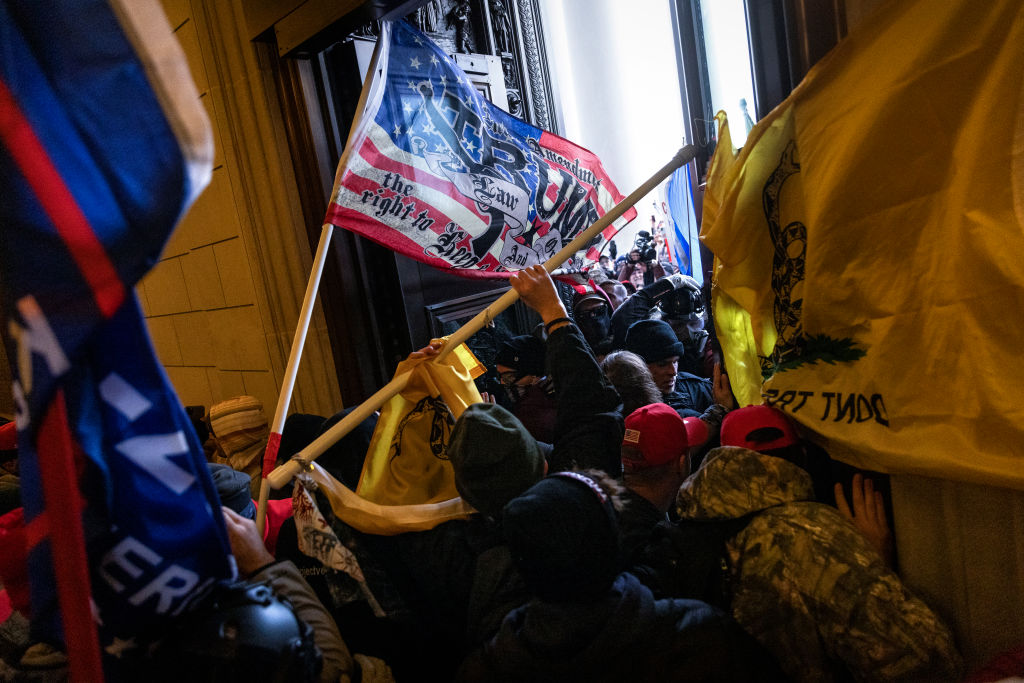Spraying The Price
March 3, 2022

The Good News
- Black female WWII unit recognized with congressional honor (AP)
- People who test positive for Covid can receive antiviral pills at pharmacies for free, Biden says (CNBC)

“There is no greater tyranny than that which is perpetrated under the shield of the law and in the name of justice.” – Montesquieu

A Feather In Their Capitol

Joshua James, 34, of Arab, Alabama, is an Iraq war veteran and member of the far-right Oath Keepers extremist group. In January, James and 10 others, including Oath Keepers founder and leader Stewart Rhodes, were indicted on charges of seditious conspiracy and obstruction in the January 6 Capitol riot. On Wednesday, James became the first of the defendants to plead guilty and agree to cooperate with federal investigators, including testifying before a grand jury. James appeared virtually in a Washington D.C. federal court; he admitted to helping lead a group that sent two tactically-equipped teams into the Capitol to stop the electoral vote count, and to organizing a cache of weapons in a hotel just outside the city. In his plea agreement, James acknowledged that Rhodes “instructed [him] and others to be prepared and called upon to … use lethal force if necessary” to keep Trump in office.
Prosecutors say the preparation for an assault on the Capitol began two days after the November 3, 2020 election, when Rhodes told his followers “to refuse to accept the election result and stated: ‘We aren’t getting through this without a civil war.’” The indictment details two months of communications between Rhodes and other Oath Keeper members, including James, in which “Rhodes outlined a plan to stop the lawful transfer of presidential power, including preparations for the use of force.” Rhodes has pleaded not guilty to the charges and claims the Oath Keepers were in Washington on January 6 to protect conservative figures from left-wing attackers. Rhodes said he did not enter the Capitol, and didn’t authorize any other members to enter the building.
Sedition is a rarely used and politically significant crime of conspiring against the U.S. government. The seditious conspiracy and obstruction counts James pleaded to each carry a prison term up to 20 years, but he’s not expected to get the maximum. So far, the longest sentence any January 6 defendant has received is five years and three months for Robert S. Palmer, who admitted to hurling a fire extinguisher, a plank, and a long pole at officers. Besides the 11 defendants charged with seditious conspiracy, several other Oath Keepers have already pleaded guilty and agreed to cooperate with the government. (WaPo, $)

“Vacuum Bombs” Used In Russian Invasion

- Despite President Putin’s claims that Ukrainian civilians wouldn’t be targeted, airstrikes have bombed and burned apartment buildings, hospitals, churches, historical buildings, and vital infrastructure. But most horrific is the confirmation by the Ukrainian ambassador to the U.S. that Russia had used a thermobaric weapon, a “vacuum bomb,” killing 70 soldiers.
- Russian vacuum bombs are a type of two-stage munition that sucks oxygen from the air to trigger an enormous explosion. The weapon can obliterate any humans in the vicinity; victims can be killed by the blast or the accompanying shock wave, and the subsequent vacuum can rupture people’s lungs.
- The effects of thermobaric weapons are compounded in enclosed spaces, making them highly effective in buildings; their primary use has been against civilian areas. They were previously used by Russia in the 1990s in Chechnya, and most recently in the Syrian conflict. A Russian vacuum bombs launcher was spotted last week near the Ukrainian border by a CNN team. (Politico, Popular Science, CNN)
You Missed A Shot
- It’s unclear exactly why Guatemalans may have rejected getting the Russian Sputnik coronavirus vaccine, but they did. Health authorities in the Central American country say over a million doses of the vaccine went unused and are now expired.
- Only about 43% of Guatemala’s 12.6 million inhabitants over age 11 are fully vaccinated. The wasted shots cost the government some $11 million, and an additional 1.7 million doses of the second Sputnik regimen will expire this month. (AP)
Additional World News
- Ukraine conflict: Russia’s Kharkiv attacks are war crimes, says Zelensky (BBC)
- Paraguay capital choked by colossal smog cloud from Argentina wildfires (Guardian)
- Police move to clear New Zealand protests as Māori king calls for end to occupation (Guardian)
- Zelensky assassination plot foiled, Ukrainian authorities say (Axios)
- Burkina Faso national conference approves 3-year military-led transition (Reuters)
- Libyan lawmakers approve new government, fueling tensions (LAT, $)

Pause In Effect
- On Wednesday, Texas District Judge Amy Meachum issued a temporary restraining order against the Department of Family and Protective Services, halting their investigation into the parents of a 16-year-old transgender girl after they sued government officials who called gender-affirming treatments “child abuse.” Meachum will hold another hearing March 11 to decide whether to broaden the injunction blocking enforcement of Governor Greg Abbott’s directive.
- It should be noted the judge’s order stopped short of preventing the state from conducting “child abuse” investigations of other children receiving similar care. Conservatives in Texas seem determined to abolish any source of information helpful to the LGBTQ community, from removing books in libraries, to removing resources for LGBTQ youths on the Texas Department of Health and Human Services suicide prevention webpage. (AP, NBC, CNN, hhs.texas.gov)
Spraying The Price
- Last July, an autopsy performed on a 5-year-old Georgia boy detected the coronavirus in his lungs and upper airways. Surprisingly, bacteria called Burkholderia pseudomallei was also found in the boy’s lungs, liver, spleen, and brain. This bacteria isn’t found in the U.S., but is generally found in contaminated soil or water in parts of South and Southeast Asia, so the CDC began investigating.
- The boy’s family hadn’t traveled outside of the country, and samples from the family’s water supply and soil outside the home turned up nothing. Burkholderia pseudomallei can also be aerosolized and inhaled, so investigators tested products inside the boy’s home. Three months later they discovered the bacteria in a lavender-smelling room spray in the house: “Better Homes & Gardens Essential Oil Infused Aromatherapy Room Spray With Gemstones,” imported from India and sold by Walmart.
- The finding eventually led investigators to solve three other cases of Burkholderia pseudomallei infection that had occurred earlier in 2021 in Texas, Kansas, and Minnesota. Details were published Wednesday in the New England Journal of Medicine. (NBC)
Additional USA News
- Texas Gov. Abbott and Beto O’Rourke are set for an election clash after primary wins (NPR)
- Wisconsin GOP’s 2020 report embraces fringe election decertification theory (Politico)
- Arizona State Senate censures lawmaker who threatened rivals with violence (NPR)
- Barring a ‘miracle,’ California snowpack will end the season below average (CNN)
- Six of Donald Trump’s lawyers subpoenaed by Capitol attack panel (Guardian)
- US Says It Is Realigning Its China Trade Policy (WSJ, $)

Stroke Of Gene-ius
- It’s not over ’till it’s over. Is it truly over? We mean the long-running fight for ownership of the gene-editing technique CRISPR. Developing any technology as complex and widely used as CRISPR invariably involves contributions from many scientists, and patent fights over claims of discovery and licensing rights are common. In CRISPR’s case, the fight was between Jennifer Doudna, professor of chemistry and molecular biology at UC Berkeley, and Feng Zhang, at the Broad Institute of Harvard and M.I.T.
- The idea that DNA could be manipulated really began revving up in the first decade of this century. By 2012, Doudna and Emmanuelle Charpentier, and their lab teams, demonstrated, for the first time, that CRISPR could edit purified DNA. Their paper was published that June. However, in January 2013, Zhang and George Church published the first studies demonstrating that CRISPR could be used to edit human cells.
- Patents are generally awarded to the first people to file – in this case, Doudna and Charpentier. But Zhang and the Broad Institute argued the earlier success with CRISPR had no bearing on whether the technique would work in complex organisms that matter most to scientists looking for ways to treat and prevent diseases. Both institutions applied for patents, and the U.S. Patent and Trademark Office (PTO) initially awarded the patent to the Broad Institute in 2014. UC Berkley contested the decision; in 2017, the PTO decided both institutes could keep their patents, meaning the Broad Institute could retain its patents for the use of CRISPR in complex human and animal cells – potentially worth billions. UC Berkeley appealed, but lost.
- CRISPR research became really big business, with venture-capital firms competing to invest millions, and any patent holder would have the right to impose licensing fees. Both Doudna and Zhang pledged to release all intellectual property to researchers without charge, and they did. But both were also involved in new companies that intended to develop CRISPR technology as therapies, as did many pharmaceutical firms and other profit-seeking enterprises. Doudna and Charpentier won the 2020 Nobel Prize in Chemistry for discovering the CRISPR-Cas9 gene-editing technique. But the patent competition wasn’t over. On Monday, the PTO said MIT and Harvard’s Broad Institute was the first to apply the tool to human cells, apparently squelching UC Berkeley’s years of efforts to get those lucrative patent rights. (The Verge, New Yorker)
Additional Reads
- MLB cancels first 2 regular-season series after MLBPA rejects league’s final proposal (ESPN)
- Paleontology ‘a hotbed of unethical practices rooted in colonialism’, say scientists (Guardian)
- Man saved after clinging to ice chunk in Alaska’s Cook Inlet (AP)
- How ‘Multiculturalism’ Became a Bad Word in South Korea (NYT, $)
- This 5,300-year-old skull shows evidence of the earliest known ear surgery (Ars Technica)
- Cities Are Unlikely Yet Powerful Weapons to Fight Climate Change (Wired)